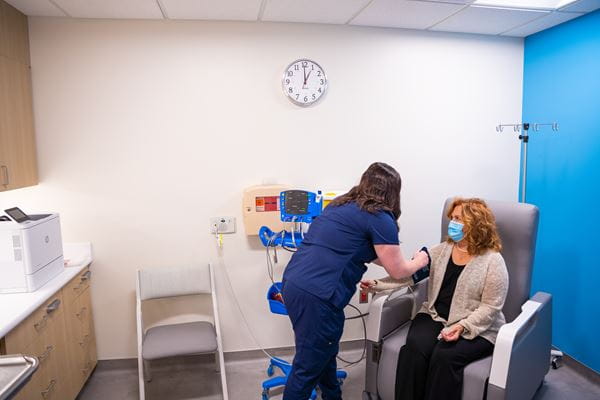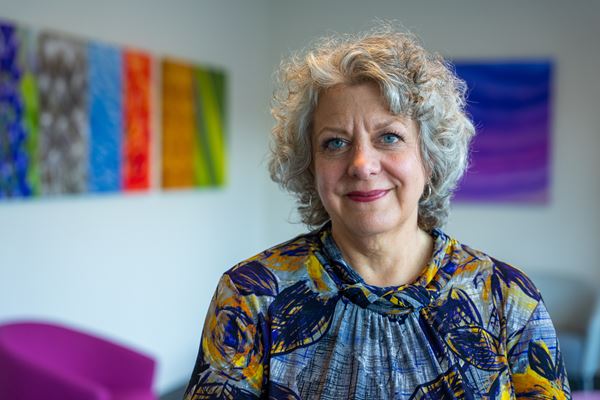
Survivorship: How we help your patients live well with cancer
Patients and health care providers often think of survivorship as life after cancer, and survivorship care as support given only after cancer treatment is complete. In reality, patients become cancer survivors the moment they receive a cancer diagnosis — and there’s no need for patients to wait to begin survivorship care.
At Allina Health Cancer Institute (AHCI), our oncology team offers a survivorship program to support patients, their loved ones and caregivers beginning at diagnosis. Our survivorship care and services are available throughout treatment and beyond to help patients maintain or even improve their quality of life.
How survivorship care works at AHCI
Our survivorship program supports patients throughout the intensive cancer treatment process with a focus on physical fitness, mental health, social supports and practical solutions. As patients work with their cancer care team to complete their treatment plan, they can simultaneously work with their survivorship team to address these needs.
At AHCI, our survivorship care complements the treatment provided by cancer care teams through a comprehensive approach. We first meet with patients to discuss the challenges they’re facing and then develop a plan with recommendations to address them.
Our cancer survivorship program offers care and services in several areas:
Cancer rehabilitation
Our rehabilitation providers specialize in working with cancer patients to help them achieve their best possible health and well-being. Depending on their specific needs, patients may meet with one or more of our cancer rehabilitation providers, including:
- Physical medicine and rehabilitation (PM&R) physicians
- Physical therapists
- Occupational therapists
- Speech-language pathologists
Fatigue, weakness and pain are the most common side effects patients experience during and after cancer treatment. Our cancer rehabilitation providers monitor for other possible short-term effects, including:
- “Chemo brain,” which is cognitive dysfunction related to treatment with certain chemotherapy drugs
- Dental and oral problems after treatment for head or neck cancers
- Endocrine changes, including hypothyroidism, after chemotherapy or hormone ablation therapy
- Incontinence after anal, bladder, colon, prostate or rectal cancers
- Lymphedema after treatment of lymph nodes
- Neuropathy, or nerve damage, after surgery, radiation or treatment with certain chemotherapy drugs
- Sexual dysfunction, especially after cancers in reproductive organs
Integrative oncology
Studies show that integrative medicine, which includes meditation, massage, tai chi and a wide range of other therapies, supports patient well-being, survival and other measures of cancer recovery. AHCI offers a specialized integrative oncology program with therapies designed specifically for patients during and after cancer treatment.
Integrative oncology refers to appropriate complementary, nonmainstream therapies provided in conjunction with conventional cancer treatments to support healing. The program is available to currently diagnosed patients in treatment or high-risk patients for cancer prevention.
Mental health counseling and psycho-oncology
Our psychological health care providers include psycho-oncologists and social workers who specialize in working with cancer patients, their loved ones and their caregivers. Among some of the services they offer:
- Oncology social workers provide an 8-session intervention at no charge to support patients’ adjustment to cancer.
- Psycho-oncologists offer counseling to address longstanding issues including and beyond a cancer diagnosis.
Oncology nutrition services
Registered dietitians at AHCI specialize in cancer nutrition to help patients overcome dietary side effects of cancer treatment. We meet with patients to determine their needs and provide customized dietary recommendations to address issues such as:
- Loss of appetite
- Nausea and vomiting
- Unintended weight loss
Monitoring and care for long-term treatment side effects

Some types of cancer treatments can cause side effects that develop months or even years after cancer treatment is complete. Our cancer survivorship specialists provide regular, ongoing services to monitor patients for these side effects and other symptoms that may indicate cancer recurrence.
In a post-treatment survivorship visit, we assess patients’ current needs and establish baseline health metrics. During that visit, we also counsel and educate patients on symptoms to watch for and recommend continued lifestyle modifications for healthy habit formation.
Additional resources for cancer survivorship
Your patients and their families have access to additional services with these programs:
- Oncology social work, with licensed clinical social workers who provide support for day-to-day practical, logistical and financial challenges
- A specialized grief support group to connect surviving family members with others who have experienced loss due to cancer
- Simple Talk program to help people communicate with their children about a cancer diagnosis in the family
- Financial navigation program to help minimize the stress and hardship arising from the financial burden of cancer treatment
Partner with Allina Health Cancer Institute: How to refer your patients
We welcome referrals from health care providers across the Twin Cities, western Wisconsin and beyond. Here’s how you can refer a patient to AHCI for cancer care:
Providers within Allina Health can place a consult order within Epic.
Providers from outside Allina Health can refer patients by calling our nearest cancer center:
- AHCI Buffalo: 763-684-7747
- AHCI Cambridge: 763-688-8700
- AHCI Coon Rapids: 763-236-0808
- AHCI Faribault: 507-497-3721
- AHCI Hastings: 651-404-1515
- AHCI Minneapolis: 612-863-0200
- AHCI New Ulm: 507-217-5562
- AHCI River Falls: 715-307-6430
- AHCI St. Paul: 651-241-5111
